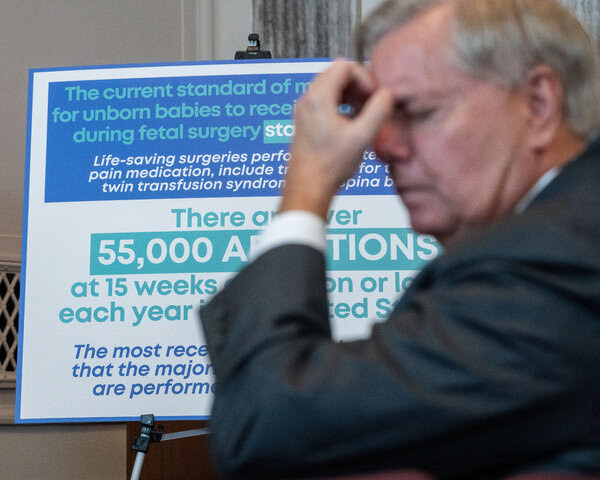Regardless of what you feel about Abortion, and it is very clear that people on the board have a clear, moral perspective on it (which is good), it is not a compelling issue for the right. You see it in the polling, the ballot initiatives (Kansas) and then how candidates are reacting to it (read: Hershel W. and other examples below).
Conversely, it is almost the only thing that Democrats run on.
Compare that to Immigration, Debt, Inflation, Crime, Covid mandates, Afghanistan, CRT, etc. where the issues are SO clear and compelling. Conservatives/Republicans are hammering home the issue - mercilessly.
Further complicating things, as noted below, is that now people want a federal ban on abortion. So what is it? A "states rights" issue or should be a federal ban? They also hem and haw when pressed about the contradiction between vaccine mandates and being pro-life.
And the candidates who are in anything other than safe R districts? They are dodging or downplaying the issue - just as what happened in 2016-2017 on the ACA repeal.
Lisa hits this on the head around P - if just 3% of the woman's voted for Trump, he pulls the state. Trump - to his credit, knew this too:
(His campaign speech - in PA)
What republicans should be doing, if they really want to spend time here versus the other core issues above, is focusing on late trimester abortions and limiting that for the health of the mother. The baby can (almost always successfully) live outside the womb. Regardless of your religious or moral beliefs, that is a clear line. The woman has been pregnant for a long time - if a decision is to be made, ample time was in place to make it.
Finally, if Trump had his druthers, I am 90%+ sure, he would get government out of it. I believe he was pro-choice up through 2010 and at least 1999 when he was 53.
Should be interesting to see how this plays out in the polls this fall.
Good morning. Republicans spent decades trying to end Roe, but the reality of banning abortion has become a burden on the party. |
| Anti-abortion campaigners outside the Supreme Court in June.Shuran Huang for The New York Times |
|
For years, abortion was a straightforward rallying cry for Republicans, a way to identify with the cultural politics of their core supporters in one word: pro-life. |
But the Supreme Court’s decision to overturn Roe v. Wade plunged the party into a complicated reproductive reality, as I reported in this story that published this morning. The decision ended federal abortion rights, essentially forcing each state to legislate its own rules. After decades of fighting for that very outcome, when it finally happened, Republicans had no clear national message or unified policy. |
Almost immediately, Republican lawmakers were thrust into messy and emotional debates over some difficult issues: child rape, life-threatening medical complications from pregnancies and the devastating diagnoses of fetuses with rare and fatal conditions. As they debated, Republicans saw a once-easy way to energize their supporters transformed into a new third rail. And Democrats saw their fortunes rise in the midterms. |
Will that be enough for Democrats to keep control of Congress? Probably not. But the issue could be a deciding factor in some close races, particularly governors’ contests where the winners may determine abortion rights in their states. |
One question, many answers |
What do Republicans believe about abortion? It all depends on whom you ask. Abortion is one of the starkest areas of disagreement within the party right now. |
In Nevada, Joe Lombardo, the sheriff of the Las Vegas area who is running for governor, says he wouldn’t change state law, which currently allows abortion up to 24 weeks of a pregnancy — one of the latest limits in the country. |
| Lindsey Graham proposed a 15-week federal abortion ban last month.Haiyun Jiang/The New York Times |
|
In the Senate, Lindsey Graham of South Carolina is pushing for a ban after 15 weeks of pregnancy, with exceptions for rape, incest and life of the mother. (Senator Mitch McConnell, the Republican majority leader, does not agree, and neither do a number of Republican colleagues.) |
In Michigan, Tudor Dixon, the Republican nominee for governor, would rather talk about something else, saying abortion “ shouldn’t be an issue.” |
And in Maine, Paul LePage, a former governor and the Republican candidate for that office, seemed to dodge the question entirely. “I don’t know what you mean by 15 weeks or 28 weeks because I don’t know,” LePage said in a debate last week. “I’m not sure I understand the question.” |
The big political problem with the strictest Republican position — total or near-total bans on abortion like those enacted in at least 13 states — is that it’s simply unpopular. |
Public opinion on abortion is notoriously hard to measure because so much of how voters view the issue depends on how surveys frame their questions. But there are a few clear data points. A majority of voters disagree with the Supreme Court’s decision to overturn Roe, saying they support a federal right to an abortion. Similarly, in a recent New York Times/Siena College poll, 62 percent of Americans said they favored abortion access in either all or most circumstances. At the same time, most voters also support some restrictions starting as women enter the second trimester of pregnancy. |
Part of what has made these questions particularly salient in the 2022 midterms is how they are embedding in the lives of female voters. From the time they get their first period to menopause, most women have an inescapable monthly clock that they discuss mostly with other women. Many of those discussions revolve around pregnancy, which for most of human history was commonly a high-risk, if not fatal, condition. |
The intimacy of the issue raises its political intensity for 50.5 percent of the population — and the even bigger percentage of women who make up the typical midterm electorate. Small changes in this group can cause big political outcomes. As Elaine Kamarck at the Brookings Institution points out, a shift of less than 3 percent of the women’s votes in Pennsylvania in 2020 could have flipped the state to Donald Trump. |
Whatever happens in the midterms, Republicans are not escaping this issue. Activists in both political parties are bracing for a decades-long fight over the future of abortion rights. |
If Republicans win control of Congress, they will face pressure to embrace national abortion bans from social conservatives who see the court’s decision as the beginning of restrictions. That position, of course, contradicts nearly a half-century of Republican Party ideology arguing for abortion laws to return to the states. |
And then there’s the matter of the 2024 presidential primary. It’s easy to imagine a debate stage where Republican candidates are pressed for details about their positions on issues like exceptions for rape, life-threatening ectopic pregnancies and when, exactly, a fetus should be considered a person. We’re already seeing those kinds of questions being asked in midterm debates for Senate and governor. |
In the post-Roe world, just being “pro-life” doesn’t quite cut it for Republican politicians. |



